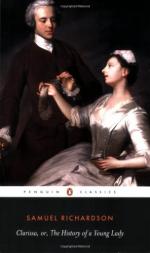What is too generally called love, ought (perhaps as generally) to be called by another name. Cupidity, or a Paphian stimulus, as some women, even of condition, have acted, are not words too harsh to be substituted on the occasion, however grating they may be to delicate ears. But take the word love in the gentlest and most honourable sense, it would have been thought by some highly improbable, that Clarissa should have been able to show such a command of her passions, as makes so distinguishing a part of her character, had she been as violently in love, as certain warm and fierce spirits would have had her to be. A few observations are thrown in by way of note in the present edition, at proper places to obviate this objection, or rather to bespeak the attention of hasty readers to what lies obviously before them. For thus the heroine anticipates this very objection, expostulating with Miss Howe on her contemptuous treatment of Mr. Hickman; which (far from being guilty of the same fault herself) she did, on all occasions, and declares she would do so, whenever Miss Howe forgot herself, although she had not a day to live:
‘O my dear,’ says she, ’that it had been my lot (as I was not permitted to live single) to have met with a man, by whom I could have acted generously and unreservedly!
’Mr. Lovelace, it is now plain, in order to have a pretence against me, taxed my behaviour to him with stiffness and distance. You, at one time, thought me guilty of some degree of prudery. Difficult situations should be allowed for: which often make seeming occasions for censure unavoidable. I deserved not blame from him, who made mine difficult. And you, my dear, had I any other man to deal with than Mr. Lovelace, or had he but half the merit which Mr. Hickman has, would have found, that my doctrine on this subject, should have governed my whole practice.’ See this whole Letter, No. XXXII. Vol. VIII. See also Mr. Lovelace’s Letter, Vol. VIII. No. LIX. and Vol. IX. No. XLII. where, just before his death, he entirely acquits her conduct on this head.
It has been thought, by some worthy and ingenious persons, that if Lovelace had been drawn an infidel or scoffer, his character, according to the taste of the present worse than sceptical age, would have been more natural. It is, however, too well known, that there are very many persons, of his cast, whose actions discredit their belief. And are not the very devils, in Scripture, said to believe and tremble?
But the reader must have observed, that, great, and, it is hoped, good use, has been made throughout the work, by drawing Lovelace an infidel, only in practice; and this as well in the arguments of his friend Belford, as in his own frequent remorses, when touched with temporary compunction, and in his last scenes; which could not have been made, had either of them been painted as sentimental unbelievers. Not to say that Clarissa, whose great objection to Mr. Wyerley




